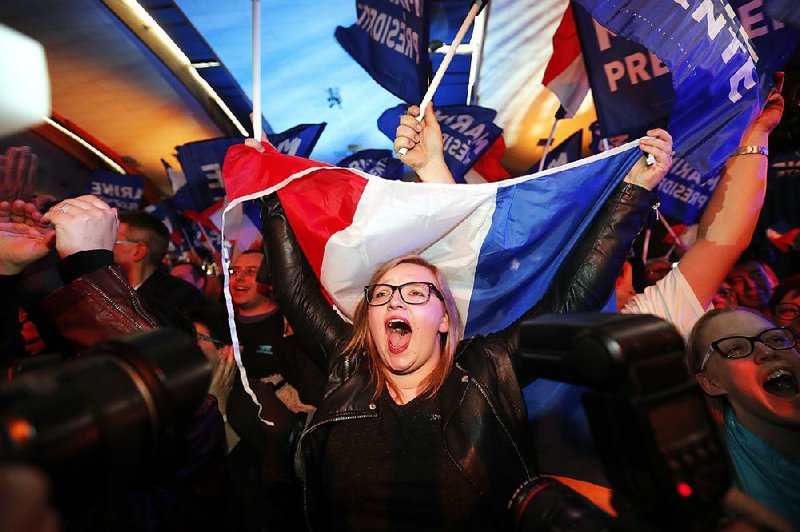PARIS -- Centrist Emmanuel Macron and far-right populist Marine Le Pen advanced Sunday to a runoff in France's presidential election, shutting out the nation's two main political parties and setting up a showdown over France's participation in the European Union.
French politicians on the left and right immediately urged voters to block Le Pen's path to power in the May 7 runoff, saying her nationalist anti-EU and anti-immigration politics would spell disaster for France.
"Extremism can only bring unhappiness and division to France," defeated conservative candidate Francois Fillon said. "As such, there is no other choice than to vote against the extreme right."
The runoff sets up a battle between Macron's optimistic vision of a tolerant France and a united Europe with open borders, and Le Pen's "French-first" platform that calls for closed borders, tougher security, less immigration and dropping the shared euro currency to return to the French franc.
The absence in the runoff of candidates from either the mainstream left Socialists or the right-wing Republicans party -- the two main political groups that have governed post-war France -- also marked a seismic shift in French politics. Macron, a 39-year-old investment banker, made the runoff on the back of a grassroots campaign without the support of a major political party.
With 90 percent of votes counted, the Interior Ministry said Macron had nearly 24 percent, giving him a slight cushion over Le Pen's 22 percent. Fillon, with just under 20 percent, was slightly ahead of the far-left's Jean-Luc Melenchon, who had 19 percent.
Melenchon late Sunday refused to concede defeat before the official count confirmed pollsters' projections, and he did not say how he would vote in the next round.
Socialist presidential candidate Benoit Hamon, who was far behind in Sunday's results, quickly conceded defeat. He was running to succeed Socialist President Francois Hollande, whose approval rating plummeted to 4 percent in November and who decided not to seek re-election.
Proclaiming that "the left is not dead," Hamon also urged supporters to back Macron.
The euro jumped 2 percent to more than $1.09 after the initial results were announced. Macron has vowed to reinforce France's commitments to the EU and euro -- and opinion polls give him a big lead heading into the second round.
Le Pen faces the runoff as the underdog. She hopes to win over far-left and other voters angry at the global elite and distrustful of the untested Macron.
Le Pen held her election day rally in Henin-Beaumont, a northern French town hard hit by factory closures. She portrayed her duel with Macron as a battle between "patriots" and "wild deregulation" -- warning of job losses overseas, mass immigration straining resources at home and "the free circulation of terrorists."
"What is at stake in this election is a referendum for or against lawless globalization," Le Pen told the cheering crowd. "Either you choose in favor of a total lack of rules, without borders, with unlawful competition, the free circulation of terrorists, or you make the choice of a France that protects.
"This is truly what is at stake," she said. "It is the survival of France."
Macron, winking at his cheering, flag-waving supporters at his election day headquarters in Paris, promised to be a president "who protects, who transforms and builds" if elected.
"You are the faces of French hope," he said. His wife, Brigitte, joined him on stage before his speech -- the only couple among the leading candidates to appear together Sunday night.
Sunday's vote came after a turbulent campaign. Hollande's most prominent Socialist successor lost to a primary challenger. So did the former center-right president, Nicolas Sarkozy. The early front-runner in the race, Fillon, sought a Margaret Thatcher-style overhaul of France's economy, but fell prey to a nepotism scandal.
Whoever wins on May 7 cannot count on the backing of France's political mainstream parties.
Even under a constitution that concentrates power in the president's hands, both Macron and Le Pen will need legislators in Parliament to pass laws and implement much of their programs. France will hold parliamentary elections in June, and neither Macron's En Marche! movement nor the National Front are expected to come close to a majority in the legislature still dominated by the traditional parties.
In Paris, protesters angry at Le Pen's advance scuffled with police. Officers fired tear gas to disperse the crowd.
Two people were injured and police detained three people as demonstrators burned cars, danced around bonfires and dodged riot police. At a peaceful protest by around 300 people at the Place de la Republique, some sang "No Marine and no Macron!" and "Now burn your voting cards."
'I want nobody'
Many voters on Sunday said they were opting for the least bad of an unpalatable range of options.
"I want nobody, and it's very complicated. I just don't want to see the extremes," said Emma Lacour, 42, who voted Sunday in the upscale Saint-Cloud suburb of Paris, where conservatives usually dominate. "I decided two minutes ago, and I'm not very happy," said Lacour, who was too dispirited to say who she picked as she walked out of the ornate 19th-century city hall that held the voting station.
Mathilde Jullien, 23, was more hopeful, saying she is convinced Macron will beat Le Pen.
"He represents France's future, a future within Europe," she said. "He will win because he is able to unite people from the right and the left against the threat of the National Front and he proposes real solutions for France's economy."
Sophie Girardeaus, 30, and her boyfriend said Hollande failed to deliver on one of his central promises from the 2012 election: to support French youths. But Girardeaus noted that France was also susceptible to the concerns seen in other countries, citing Britain's vote to leave the EU and the U.S. vote to elect President Donald Trump.
"I hope that particularly left-wing voters will still come out to vote against the far-right populists," Girardeaus said.
In the Parisian suburb of Saint Denis, voters worried about the impact of terrorism on the election.
"If Le Pen makes it, everything will become worse for us. Then, the French will show their real faces. I don't think it is exaggerated to say that there would be violence," said Ginette Beljour, 40, who wanted to vote for Macron.
Standing in front of a polling station in Villeneuve-la-Garenne, Le Pen supporter Stephane Debuigne, 29, said France needed a political leader who was capable of saying 'No' to the German chancellor or the European Union.
"People like Francois Hollande always only say yes to them," he said. "France needs a politician who cares about the people who work and who will fix our immigration problem."
In Henin-Beaumont, where Le Pen held her rally, David and Linda Renard were hopeful that Le Pen could work to restore the franc.
"My salary was much higher when we were on the franc," said David, 41, who said he worked in financial services.
Linda Renard, 42, a nurse, said she was not bothered by the history of the National Front as she cast her ballot.
Marine Le Pen "doesn't have the ideas of her father," she said, referring to Jean-Marie Le Pen, a convicted Holocaust denier who once referred to the Nazi gas chambers as a "detail of history," a remark that landed the National Front in the political wilderness for decades.
Marine Le Pen "has changed immensely since the last election," Linda Renard said. "She's less blunt, more composed, and it's clear that she reflects very carefully on what she says."
Even as Macron and Le Pen advanced to the next round, the sheer uncertainty was a measure of the unmooring of French political life.
"We've had two consecutive presidents, Nicolas Sarkozy and Francois Hollande -- very different orientations, very different policies, but still we have the same economic problems," said Bruno Cautres, who studies voting behavior at the Center for Political Research at Sciences Po. "It has been one of the best arguments of Marine Le Pen: 'Why not me?'"
Information for this article was contributed by John Leicester, Lori Hinnant, Elaine Ganley, Alex Turnbull, Chris den Hond, Angela Charlton, Raphael Satter, Samuel Petrequin, Nicolas Vaux-Montagny, Sylvie Corbet, Nadine Achoui-Lesage, Philippe Sotto and Brian Rohan of The Associated Press; by Michael Birnbaum, James McAuley, Rick Noack and Virgile Demoustier of The Washington Post; and by Helene Fouquet, Gregory Viscusi, Gaspard Sebag, Geraldine Amiel, Mark Deen, John Follain, Ania Nussbaum, Ben Sills, Fabio Benedetti-Valentini, David Goodman, Robert Williams, Stefania Spezzati and Andre Tartar of Bloomberg News.
A Section on 04/24/2017

